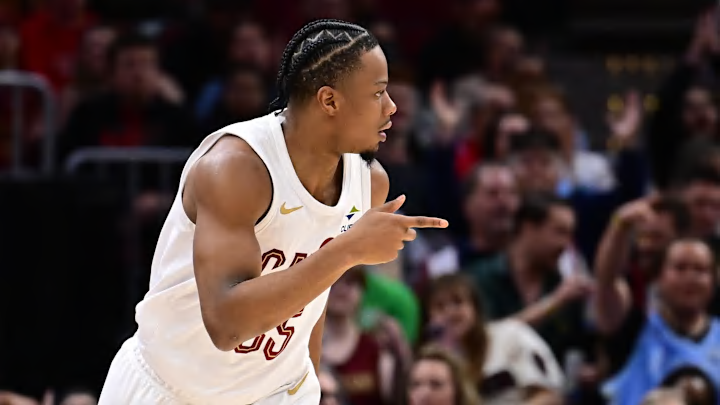The Chicago Bulls made one of the more underrated moves of the offseason, trading Lonzo Ball to the Cleveland Cavaliers in exchange for Isaac Okoro. After starting the 2024–25 season with a thin forward unit, the Bulls have since invested heavily to strengthen the position, hence the Ball for Okoro swap.
To kick off last season, Billy Donovan rolled out Patrick Williams and Zach LaVine at forward, with Julian Phillips off the pine. Williams has forever underperformed, yet he was the de facto starting power forward following the signing of a $90 million contract. LaVine lined up at small forward, yet he much more resembles a shooting guard, especially defensively. And while Phillips is promising, he wasn't necessarily ready for a primary reserve role in his sophomore season.
Thus, the Bulls have since turned to 20-year-old Matas Buzelis, who was a bright spot in the latter part of his rookie season; traded for sharpshooter Kevin Huerter; drafted rangy wing Noa Essengue; and, of course, acquired Okoro.
Chicago has addressed its shoddy wing unit with significant investment, a necessary step forward. Both the NBA Champion and the runner-ups were loaded on the wing. So were the Eastern and Western Conference runner-ups. It's no coincidence that versatile wings are key to unlocking respective teams' offenses and defenses.
Swapping Lonzo Ball for Isaac Okoro was a clever move
Yet, the Bulls' trade for Okoro wasn't exactly hailed as a savvy move. Bleacher Report handed the Bulls a C- for the swap, as did CBS Sports. Nonetheless, flipping Ball for Okoro was a smart gamble.
First off, Ball just can't stay healthy. He's never appeared in more than 65 games in a season, and only appeared in 35 contests a season ago following two lost seasons due to multiple knee injuries. Moreover, while Ball's return is an incredible story, his comeback season didn't go too well. He averaged 7.6 points, 3.4 rebounds, and 3.3 assists, but shot 36.6 percent from the field and 34.4 percent from three-point range.
Ball will almost certainly be limited to a reduced role moving forward. On the flip side, Okoro has appeared in fewer than 65 games once in his career—last season. He may not be as well-rounded as Ball, or as Ball once was, but he's three years younger and, as mentioned, a much-needed wing.
Okoro, at 6-foot-5 and 225 pounds, is a rugged defender. Opponents shot 3.3 percent worse from the field when guarded by him. Furthermore, he routinely put his versatility on display, considering his top five matchups were Damian Lillard, Zach LaVine, Cameron Johnson, Cam Thomas, and Ja Morant a season ago. With so-so defenders, Josh Giddey and Coby White making up the Bulls' backcourt, Okoro's presence is imperative.
However, Okoro’s biggest drawback—now and always—has been his offense. He has never averaged double figures and has demonstrated a passive approach reminiscent of Patrick Williams. Okoro has never attempted more than nine field goals nor four three-pointers per game in any season in his career.
Okoro has failed to develop a reliable offensive game
This past season, the former Auburn Tiger shot 46.4 percent from the floor and 37.1 percent from three, but averaged 4.9 attempts from the floor and 2.7 from beyond the arc. More than three-fourths of his field goals and every single one of his three-pointers were assisted. His offense was extremely limited, but (and, a big but) he played alongside four All-Stars in Darius Garland, Donovan Mitchell, Evan Mobley, and Jarrett Allen.
Okoro was far from a focal point; in fact, he registered a 12.5 usage rate—second-to-last on the team and 175th of 180th qualified players. The 6-foot-5 wing was relegated solely to spot-up duty on offense.
On the bright side, a change of scenery presents a new opportunity. Okoro should start for the Bulls, who, unlike the Cavaliers, don't feature a single All-Star. He won't immediately be featured as a go-to option offensively, and likely never will, but he'll have more opportunities on the Bulls.
Billy Donovan runs a fast-paced offense designed to keep everyone involved. Chicago ranked fifth in the NBA in assists and second in pace. Additionally, the Bulls generated a myriad of open three-point looks, 25.6 per game, which ranked first in the association by a wide margin.
Averaging north of 15 points per game isn't the likeliest scenario, but clearing double-digits for the first time in his career isn't out of the question. Okoro has seen his usage rate dip since his rookie season, but he should finally get a reprieve with Donovan and the Bulls.
